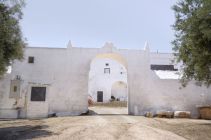you are in:
News
In the past, the Italian term masseria referred to a set of rustic funds, not necessarily with buildings, bound to a single owner. Initially it was a center of production, but since the seventeenth century, it gradually become a settlement. Although small in size, it was self-sustaining. Usually, the masseria is surrounded by dry stone walls that identify the perimeter of the property, within which there are plots of farmlands or pastures. The complex of the farm often includes a courtyard, wells, stables, sheepfold and jazzo (the fence for the sheep); food storages, wine presses, threshing floor paved to beat the grain and piles of stone for watering livestock; the oven, the orchard, the mizzen for grazing horses and cattle, and finally the church.
The type of masseria- farm changes depending on the morphology of the surrounding environment and the agrarian possibilities that the area offers. The large arable land along the coast, favoring pastures, led to the development of the so-called masseria di pecore (masseria farm for sheeps)." The fortified farm is the most common type in the plain of the olive groved park: it is characterized by defensive elements such as corner towers, drawbridge, vents and drains, few openings and a compact structure. Most of the farms are located in correspondence of the lame where, along the rocky battlements, they made underground oil mills, olives trees and jazzi.
Today, many masseria farms in the area of the park still have the role of ancient products production and processing centers, and in many cases this activity is integrated with rural hospitality.
Newsletter
Park Authority












